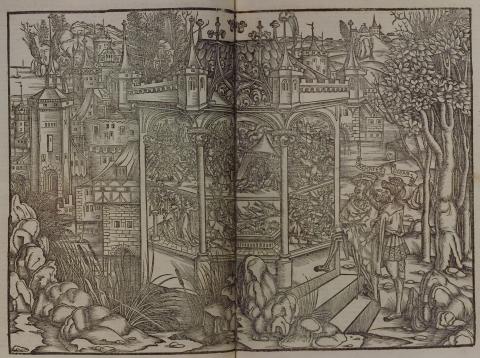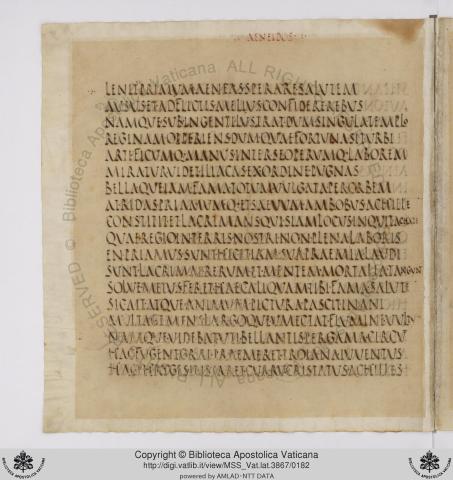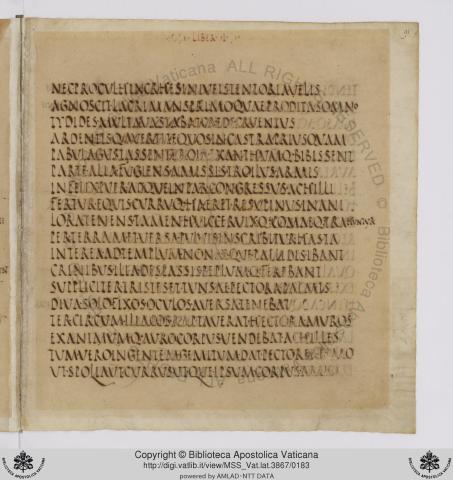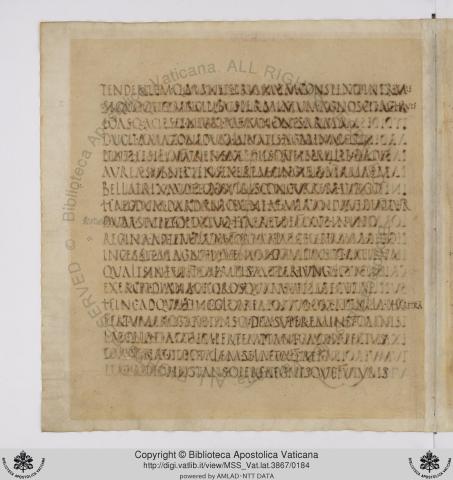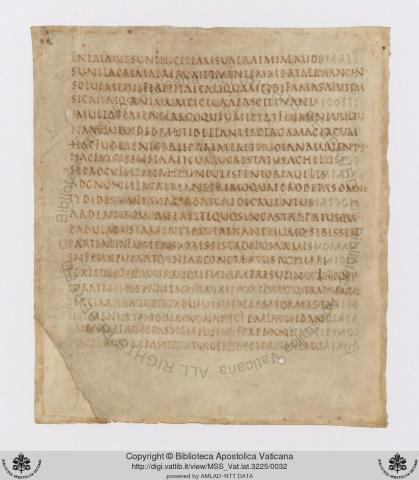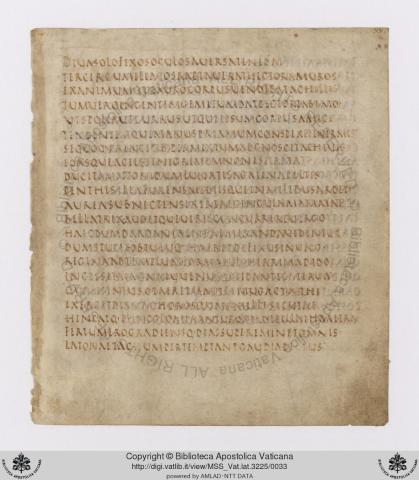CORE VOCABULARY
pīctūra, ae, f.: the art of painting; painting, 1.464. (pingō)
pāscō, pāvī, pāstus, 3, a. and n.: to furnish with food; to feed; rear, breed, 6.655; nourish, 1.608; (fig.), 1.464; let grow, 7.391; cherish, indulge, nourish, 10.627; pass. as dep., pāscor, pāstus sum, 3, a. and n., to graze, 1.186; feed upon, eat, 2.471; use for pasture, to pasture, 11.319.
inānis, e: (adj.), empty, void, 3.304; light; vain, idle, fruitless, 4.210; valueless, trivial; little, brief, 4.433; lifeless, unreal, 1.464; shadowy, 6.269; unsubstantial, shadowy, airy, phantom, 6.651; subst., ināne, is, n., void space, a void, 12.354.
gemō, uī, itus, 3, n. and a.: to groan, 7.501; sigh, 1.465; bemoan, bewail, lament, 1.221; of inanimate things, creak, 6.413.
largus, a, um: (adj.), ample; spacious, expansive, 6.640; plentiful, copious, flowing, 1.465; bountiful, free, 10.619; w. gen., lavish, 11.338.
ūmectō, āvī, ātus, 1, a. and n.: to moisten, bedew, bathe, 1.465.
ut (utī): (adv., interrog.), in what manner, how? 1.466, et al.; sometimes with indic. in a dependent question, 6.855; how gladly, 8.154.
bellō, āvī, ātus, 1, n., and bellor, dep. 1, n.: to wage war; fight, 1.466; dep., 11.660; subst., bellāns, antis, c. pl., bellantēs, ium or um, combatants, warriors, 1.466. (bellum)
Pergama, ōrum, n., Pergamum, ī, n., and Pergamus (-os), ī, f.: 1. The citadel or walls of Troy, 3.87; Troy, 4.344, et al. 2. The Trojan citadel of Helenus in Epirus, 3.336.
circum: (adv.), about, around; (prep. with acc.), around, about.
hāc: (adv.), by this way or route, 8.203; this way, here, 1.467; on one side, 12.565.
Grāī (Grāiī) (dissyll.), ōrum, m.: the Greeks, 1.467, et al.
Trōiānus, a, um: adj. (Trōia), Trojan, 1.19; subst., Trōiānus, ī, m., a Trojan, 1.286; pl., Trōiānī, ōrum, m., the Trojans, 5.688.
iuventūs, ūtis, f.: youthfulness; the age of youth; collective, young people, the youth; warriors, 1.467. (iuvenis)
Phryges, um, m.: Phrygians; the inhabitants of Phrygia, which originally included the Troad; hence, also, Trojans, 1.468, et al.; sing., Phryx, ygis, m., a Phrygian or Trojan, 12.99.
īnstō, stitī, 1, n.: to stand on or upon; w. dat., acc., inf., or alone; w. dat., to stand on, 11.529; stand or hang over, 10.196; (w. acc.), to work at, ply work upon, 8.834; (w. inf.), urge on, press on, 1.423; persist, 10.118; (alone), to follow up, press on; pursue, 1.468; struggle, 12.783; be near at hand, approach, threaten, 12.916; to be urgent, important, incumbent, 4.115.
cristātus, a, um: adj. (crista), crested, plumed, 1.468.
Achillēs, is (eos or ī), m.: the son of Peleus, king of Thessaly, and Thetis, daughter of Nereus, 1.468, et al.
nec or neque: (adv. and conj.), and not; neither, nor, 1.643, et al.; in prohibition, 3.394, et al.; neque (nec) — neque (nec), neither — nor, 5.21, et al.; nec — et, or -que, may be rendered neither — nor, 12.801; 2.534; nec nōn, and also, nor less, 6.183; nec nōn et, and also, 1.707.
Rhēsus, ī, m.: a Thracian king allied with the Trojans, 1.469.
niveus, a, um: adj. (nix), snowy, of snow; snow-white, 1.469.
tentōrium, iī, n.: a tent, 1.469. (tendō)
vēlum, ī, n.: a cloth; sail, 1.103, et al.; a curtain, canvas, covering, 1.469.
adgnoscō, nōvī, nitus, 3, a.: to recognize, 1.470.
lacrimō, āvī, ātus, 1, n. and a.: to shed tears, weep, 1.459. (lacrima)
Tӯdīdēs, ae, m.: the son of Tydeus, Diomedes or Diomed, 1.97, et al.
vāstō, āvī, ātus, 1, a.: to make void or empty; to desolate, lay waste, ravage, devastate, 1.471, et al.; deprive of, strip, rob, with acc. and abl., 8.8. (vāstus)
cruentus, a, um: (adj.), bloody, blood-stained, 1.296; covered with blood, 10.498.
ārdēns, entis: burning, hot, sparkling, flaming, 5.637; bright, 4.482; impassioned, ardent, eager, 1.423; spirited, fiery, 1.472; glowing, lofty, 6.130; fierce, furious, 2.529; angry, 6.467. (ardeo)
āvertō, vertī, versus, 3, a.: to turn (anything) away from, followed by an abl. with or without a prep., 1.38, et al.; turn or drive away, 1.472, et al.; transfer, with acc. of place, 4.106; drive away, end, 4.547; neut. by omission of se, to turn away, 1.402; (pass.), avertī, as middle or dep., with acc., to be averse to; to shun, loathe.
pābulum, ī, n.: feeding material; food, pasturage, pasture, 1.473. (pāscō)
gustō, āvī, ātus, 1, a.: to taste, 1.473. (gustus, taste)
Trōia, ae, f.: 1. Troy, the capital of the Troad, 2.625, et al. 2. A city built by Helenus in Epirus, 3.349. 3. A part of the city of Acesta in Sicily, 5.756. 4. The name of an equestrian game of Roman boys, 5.602.
Xanthus, ī, m.: 1. The Xanthus or Scamander, a river near Troy, 5.808, et al. 2. A small river in Epirus named by Helenus after the Trojan Xanthus, 3.350. 3. A river in Lycia, 4.143.
bibō, bibī, 3, a.: to drink, 1.473, et al.; (fig.), take in, drink in, 1.749; of weapons, 11.804.
Trōilus, ī, m.: one of the sons of Priam, 1.474.
īnfēlīx, īcis: (adj.), unlucky; unfortunate, luckless, unhappy, 1.475, et al.; sad, miserable, 2.772; of ill omen, ill-starred, ill-boding, fatal, 2.245; unfruitful.
impār, aris: (adj.), unequal, in unequal combat, 1.475; unequally matched.

